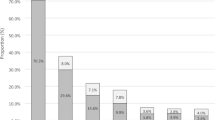Abstract
Instead of regarding a particular type of gambling activity (for example, electronic gambling machines, table games) as an isolated factor for problem gambling, recent research suggests that gambling involvement (for example, as measured by the number of different types of gambling activities played) should also be considered. Using a large sample of the Victorian adult population, this study found that the strength of association between problem gambling and the type of gambling reduced after adjusting for gambling involvement. This finding supports recent research that gambling involvement is an important factor in assessing the risk of problem gambling. The study also provides insights into the measurements of gambling involvement and provides alternative statistical modelling to analyse problem gambling.
Similar content being viewed by others
References
Afifi, T. O., LaPlante, D. A., Taillieu, T. L., Dowd, D., & Shaffer, H. J. (2014). Gambling involvement: considering frequency of play and the moderating effects of gender and age. International Journal of Mental Health and Addiction, 12(3), 283–294. doi:10.1007/s11469-013-9452-3.
Billi, R., Stone, C. A., Abbott, M., & Yeung, K. (2014a). The victorian gambling study (VGS) a longitudinal study of gambling and health in Victoria, 2008–2012: design and methods. International Journal of Mental Health and Addiction, 13(2), 274–296. doi:10.1007/s11469-014-9528-8.
Billi, R., Stone, C. A., Marden, P., & Yeung, K. (2014b). The victorian gambling study of gambling and health in Victoria, 2008–2012. Melbourne, Australia: Department of Justice, State Government of Victoria and Victorian Responsible Gambling Foundation Retrieved May 20, 2015 from http://www.responsiblegambling.vic.gov.au.
Coxe, S., West, S. G., & Aiken, L. S. (2009). The analysis of count data: a gentle introduction to poisson regression and its alternatives. Journal of Personality Assessment, 91(2), 121–136. doi:10.1080/00223890802634175.
Currie, S. R., Casey, D., & Hodgins, D. C. (2010). Improving the Psychometric Properties of the Problem Gambling Severity Index. Canada: The Canadian Consortium for Gambling Research. Retrieved 9 June, 2015 from http://www.researchgate.net/publication/228403570_Improving_the_Psychometric_Properties_of_the_Problem_Gambling_Severity_Index.
Ferris, J., & Wynne, H. (2001). The Canadian Problem Gambling Index: Final report. Ottawa: Canadian Centre on Substance Abuse. Retrieved 9 June, 2015 from http://www.cclat.ca/pdf/ccsa-00805-200.pdf.
Halme, J. T. (2011). Overseas internet poker and problem gambling in Finland 2007: a secondary data analysis of a Finnish population survey. Nordic Studies on Alcohol and Drugs, 28(1), 51–63. doi:10.2478/v10199-011-0005-4.
Hare, S. (2009). A study of gambling in Victoria - problem gambling from a public health perspective. Melbourne, Australia: Department of Justice, State Government of Victoria Retrieved May 20, 2015 from http://www.responsiblegambling.vic.gov.au.
LaPlante, D. A., Nelson, S. E., Labrie, R. A., & Shaffer, H. J. (2011). Disordered gambling, type of gambling and gambling involvement in the British gambling prevalence survey 2007. European Journal of Public Health, 21(4), 532–531. doi:10.1093/eurpub/ckp177.
LaPlante, D. A., Afifi, T. O., & Shaffer, H. J. (2013). Games and gambling involvement among casino patrons. Journal of Gambling Studies, 29(2), 191–203. doi:10.1007/s10899-012-9307-z.
Long, J. S., & Freese, J. (2006). Regression models for categorical dependent variables using stata (2nd ed., ). College Station, TX: Stata Press.
Miller, N. V., Currie, S. R., Hodgins, D. C., & Casey, D. (2013). Validation of the problem gambling severity index using confirmatory factor analysis and rasch modelling. International Journal of Methods in Psychiatric Research, 22(3), 245–255. doi:10.1002/mpr.1392.
Phillips, J. G., Ogeil, R., Chow, Y. W., & Blaszczynski, A. (2013). Gambling involvement and increased risk of gambling problems. Journal of Gambling Studies, 29(4), 601–611. doi:10.1007/s10899-012-9325-x.
Shaffer, H. J., & Martin, R. (2011). Disordered gambling: etiology, trajectory, and clinical considerations. Annual Review of Clinical Psychology, 7, 483–510. doi:10.1146/annurev-clinpsy-040510-143928.
Slutske, W. S. (2007). Longitudinal studies of gambling behavior. In G. Smith, D. C. Hodgins, & Williams. R.J. (Eds.), Research and Measurement Issues in Gambling Studies. UK: Elsevier Inc.
StataCorp (2009). Stata statistical software: release 11. College Station, TX: StataCorp LP.
Welte, J. W., Barnes, G. M., Tidwell, M.-C. O., & Hoffman, J. H. (2009). The association of form of gambling with problem gambling among American youth. Psychology of Addictive Behaviors: Journal of the Society of Psychologists in Addictive Behaviors, 23(1), 105–112. doi:10.1037/a0013536.
Zuckerman, R. (2012). Psychological Factors and Addiction: Personality. In H. J. Shaffer, D. A. LaPlante, & S. E. Nelson (Eds.), The American psychological association addiction syndrome handbook (Vol. 1 Foundations, Influences, and Expressions of Addiction. Washington, D.C.: American Psychological Association Press.
Acknowledgments
The Office of Liquor, Gaming and Racing, Department of Justice and Regulation, Victoria permitted access to the Victorian Gambling Study baseline dataset. However, the findings and conclusions of this paper are those solely of the author(s) and do not necessarily represent the views of the Department. KY would like to thank Ms. Rosa Billi and Ms. Christine Stone for their useful comments and supports. Also, thanks to Mr. Paul Marden for his encouragement. DW would like to acknowledge the support of NHMRC Centre of Research Excellence grant, ID#1035261, awarded to the Victorian Centre for Biostatistics (ViCBiostat).
Author information
Authors and Affiliations
Corresponding author
Ethics declarations
Conflict of Interest
Kristal Yeung is employed as a Research Data Analyst at the Victorian Responsible Gambling Foundation.
Rights and permissions
About this article
Cite this article
Yeung, K., Wraith, D. Considering Gambling Involvement in the Understanding of Problem Gambling: A Large Cross-Sectional Study of an Australian Population. Int J Ment Health Addiction 15, 166–181 (2017). https://doi.org/10.1007/s11469-015-9619-1
Published:
Issue Date:
DOI: https://doi.org/10.1007/s11469-015-9619-1




